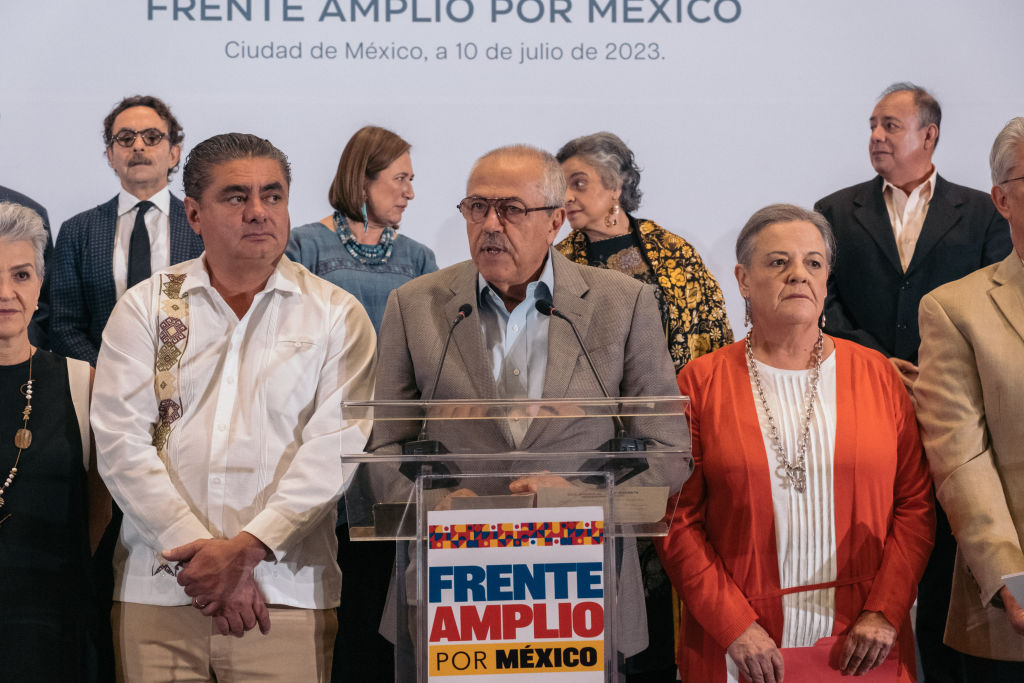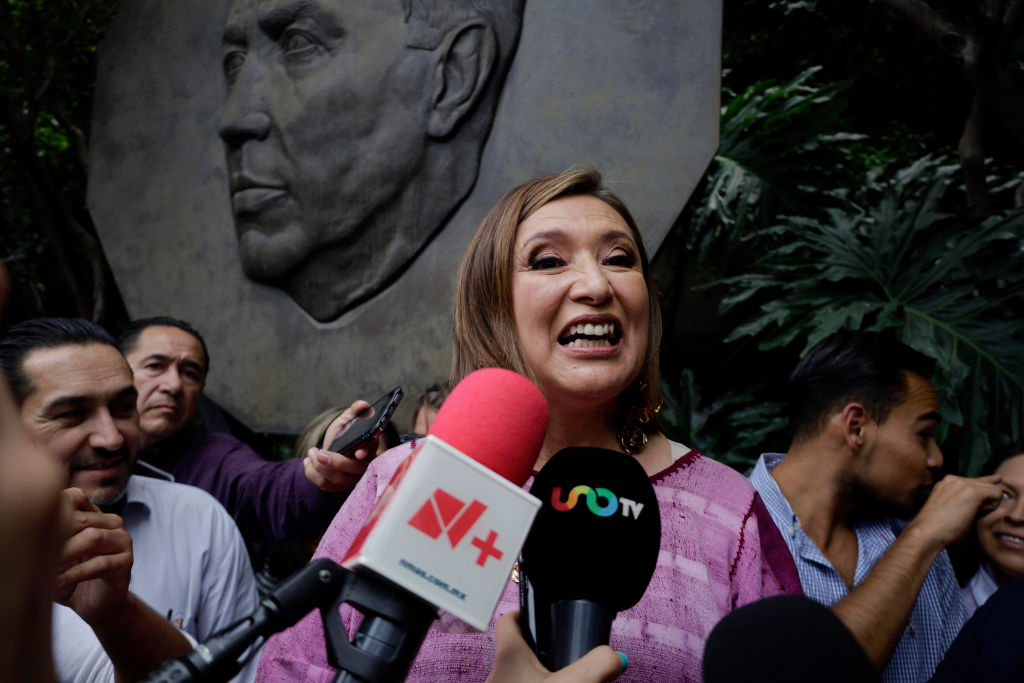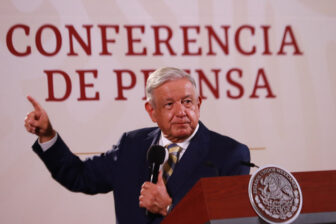One early morning a month ago, Xóchitl Gálvez knocked on the door of Mexico’s National Palace. After President Andrés Manuel López Obrador, also known as AMLO, accused her of planning to end popular social programs, the opposition senator decried his comments as false and secured a judge’s order allowing her to respond in person at one of his daily press conferences. When she arrived at the palace, order in hand, the large wooden doors stayed shut.
But AMLO’s decision to deny her entry had unintended consequences: It launched Gálvez’s presidential bid and, with it, what has been nothing short of a nation-wide media frenzy over her potential candidacy. Before that, she hadn’t appeared in polling for the top seat and was instead viewed as a contender to be mayor of Mexico City. Then, on June 27, Gálvez stood across the street from the National Palace where AMLO resides. “While that door was closed, thousands of Mexicans have opened theirs to me,” she said, and announced she would compete to represent the Frente Amplio Por México alliance in next year’s elections. “Suddenly, I think it hit a lot of people: She could be the one,” said political analyst Carlos Bravo Regidor.
Now the big question is whether the opposition finally struck gold or if what’s been termed “Xóchitl-mania” is a flash in the pan. After all, the opposition has struggled in the face of AMLO’s popularity and populist message to come up with names that could be considered competitive against his perceived favorite, former Mexico City Mayor Claudia Sheinbaum, or ex-Foreign Minister Marcelo Ebrard. The two candidates from AMLO’s governing Morena party have long led polling to replace him when his six-year term ends next year.
Then Gálvez, 60, arrived on the scene, riding her bike and donning a traditional Indigenous huipil blouse with a personal story that differentiates her from the Mexican political elites AMLO often rails against. Born into humble, Indigenous origins in a small town in the state of Hidalgo, Gálvez—whose first name means “flower” in Nahuatl—overcame having an alcoholic, violent father to become a self-made woman. She earned a degree in computer engineering and founded two tech firms before entering politics as the head of the National Institute of Indigenous Peoples during the administration of Vicente Fox (2000–2006). Despite representing the conservative National Action Party (PAN) in her current role as senator, she backs progressive policies on issues such as the environment, abortion and LGBTQ+ rights. And she’s managed to steer clear of corruption scandals in a country where many traditional politicians are tainted.
She also has some of the traits long identified with AMLO himself, including a down-to-earth style with voters. “Xóchitl has the ability to connect directly with people in a very genuine manner. It’s clear in the way she speaks. She’s spontaneous,” said political journalist Fernanda Caso. “And she knows how to make headlines.”
Indeed she does. Last year, Gálvez presented a LEGO version of a Houston mansion at the center of a scandal involving one of AMLO’s sons, arguing that Morena plays at governing, “so I’m bringing them this toy to see if they like it.” In December, she showed up dressed in a dinosaur costume to protest an electoral reform she said would return Mexico to its less democratic past.
AMLO’s repeated mentions of her in his daily press conference appear to have only helped her gain the spotlight. He has sought to link her with the oligarchic “mafia of power” he says is behind the Frente Amplio, made up of the PAN, PRI and PRD opposition parties. He claims Gálvez, who lost a 2010 bid to be governor in her home state, is out of touch as she managed to win only one election, for head of government of Miguel Hidalgo, the wealthiest district in the capital. So far, it seems like his punches are not landing. Gálvez herself joked that he mentions her name so often that he must have a crush on her. “She’s fighting in the ring with the president when she’s supposed to be fighting with the other opposition hopefuls. And this very quickly takes her to the next level,” said Bravo Regidor. “This is gold for her.”
That doesn’t mean Gálvez has a clear path to the presidency. “The first challenge is maintaining the momentum she has,” said Caso. “It’s not easy to maintain that level of relevance in the media.” To become the Frente Amplio’s candidate, Gálvez needs to beat a dozen rivals in a process set to reveal a candidate in early September. Morena will announce its own candidate at the same time and, Caso said, that person will have a leg up through an organized communications push.

Then there’s the fact that one of her strengths—her independence—is also a vulnerability. In her political roles she has represented the PAN, but Gálvez never officially became a member of any party. While that seems a plus, considering all three parties in the Frente Amplio face high levels of disapproval, it also means that she has to corral support from three distinct political forces to build proposals and a team. “At some point she needs to bring together a vision of the country that is not purely anti-AMLO,” said Bravo Regidor. “When push comes to shove, if she becomes the candidate, it’s going to be incredibly hard for her to put together a campaign team that works and that represents all the people that are supporting her.”
So little time has passed since Gálvez emerged as a contender that there is limited polling available to indicate where she stands, though El Financiero shows her approval jumped 10 points from the end of June to the beginning of July. Alejandro Moreno, who heads the outlet’s polling, calls the increase remarkable and said Gálvez’s profile as “an outsider and a maverick” could appeal to young voters who don’t identify with parties. But among voters who do, the picture is different. With PAN supporters, Gálvez is, thus far, neck-and-neck with long-time legislator Santiago Creel, while PRI supporters largely back former party President Beatriz Paredes. “How to close ranks once there’s a winning candidate is going to be very important,” says Moreno.
When Gálvez launched her candidacy, she said, “The doors of the National Palace can only be opened from the inside. That’s why we’re going to open that door to millions of Mexicans.” There’s a long race ahead and Gálvez is at just the beginning of it. But there’s no doubt she’s knocking.
—
Zissis is editor-in-chief of AS/COA Online. She was based in Mexico City from 2013–21, during which time she covered, among other topics, the country’s 2018 elections.









